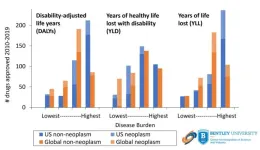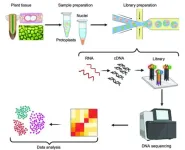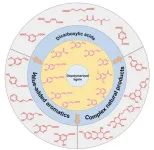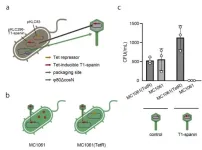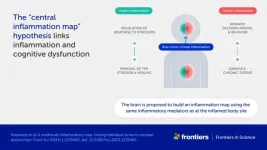(Press-News.org) BENTLEY UNIVERSITY
Drug approvals in the United States between 2010-2019 were aligned with the US, but not global, burden of disease and the increasing number of expedited drug approvals could make the gap worse according to a study in the BMJ Open. The study also demonstrates that drugs indicated for conditions with the greatest burden of disease were less likely to be approved through the FDA’s expedited approval programs that reduce the timeline and cost of drug development, thus making it relatively more expensive to develop these products. US markets and FDA approval play an important role in shaping the product portfolios of global pharmaceutical companies; as such, expedited approval programs may inadvertently disincentivize development of drugs for conditions associated with greatest burden of disease.
The study from Bentley University’s Center for Integration of Science and Industry titled “Association between expedited review designations and the US or global burden of disease for drugs approved by the US Food and Drug Administration 2010-2019: a cross-sectional analysis” used metrics developed by the World Health Organization (WHO) to measure the years of life lost (YLL), years of healthy life lost with disability or ill health (YLD), and total disease burden (disability-adjusted life years, DALYs) associated with the conditions treated by the 387 drugs approved by the FDA from 2010-2019.
This research showed that the majority of drug approvals were indicated for conditions in the highest quartile of US disease burden and years of life lost. In contrast, only a quarter of these approvals were indicated for conditions in the highest quartile of global disease burden or years of healthy life lost with disability or ill health. There was no alignment between the indications for approved drugs and either US or global disability. Since the US burden of disease represents <4% of the global disease burden, these data indicate that there is little alignment between the drugs being developed by the global pharmaceutical industry and the health needs of global human populations.
The four expedited review programs in the US – fast track, breakthrough therapy, accelerated approval, and priority review – are each designed to reduce the timelines or costs of developing products for selected “serious” diseases and have been widely adopted by industry. The present study shows that the likelihood of a drug receiving one or more designations for expedited approval was lower for products indicated for conditions with greater burden of disease in US or global populations and was dramatically lower for products targeting the greatest years of healthy life lost with disability or ill health.
“Product development by global pharmaceutical companies is strongly influenced by potential sales in US markets, and companies typically see little commercial opportunity in developing products for diseases that primarily afflict low- or middle-income countries” said Dr. Fred Ledley, Director of the Center for Integration of Science and Industry and Professor of Natural & Applied Sciences and Management at Bentley University. “If expedited review programs disproportionately reduce the cost of developing products indicated for conditions with lower disease burden, this could inadvertently disincentivize development of products that address the greatest burden of human disease.”
This paper is one of a series from the Center for Integration of Science and Industry examining the public sector investment and impacts of drugs approved by the FDA from 2010-2019.
Dr. Matthew Jackson, a former fellow at the Center for Integration of Science and Industry, was the lead author of this study along with Dr. Gregory Vaughan, Associate Professor of Mathematical Sciences, and Dr. Ledley.
This work was supported by grants from the Institute for New Economic Thinking and National Biomedical Research Foundation to Bentley University.
THE CENTER FOR INTEGRATION OF SCIENCE AND INDUSTRY at Bentley University focuses on advancing the translation of scientific discoveries to create public value. The Center is an environment for interdisciplinary scholarship spanning science, data analytics, business, and public policy. For more information, visit www.bentley.edu/sciindustry and follow us on Twitter/X @sciindustry and LinkedIn. The Center for Integration of Science and Industry is an affiliate of the Center for Health and Business at Bentley University.
BENTLEY UNIVERSITY is one of the nation’s top business schools and a lifelong-learning community that creates successful leaders who make business a force for positive change. With a combination of business and the arts and sciences and a flexible, personalized approach to education, Bentley provides students with critical thinking and practical skills that prepare them to lead successful, rewarding careers. Founded in 1917, the university enrolls >4,000 undergraduate, graduate, or PhD students and is set on 163 acres in Waltham, Massachusetts, 10 miles west of Boston. For more information, visit bentley.edu. Follow us on Twitter/X @BentleyU #BentleyUResearch.
END
US drug approvals 2010-2019 align with US, but not global, burden of disease; expedited approval programs may make the gap worse
Expedited approval programs may disincentivize development of drugs for conditions associated with greatest burden of disease
2024-03-12
ELSE PRESS RELEASES FROM THIS DATE:
Rising incidence of Legionnaires’ disease due to cleaner air
2024-03-12
A study links a rise in a serious bacterial illness to an unexpected factor: a decline in air pollution. Legionnaires’ disease is a respiratory illness with a fatality rate of 10–25% that is caused by inhaled Legionella bacteria. The bacteria live in water and outbreaks have been linked to water sources such as cooling towers, which cool indoor spaces by dissipating heat into the atmosphere in the form of water droplets and vapor. Other sources include improperly maintained public fountains, hot tubs, ice machines, home humidifiers, and showers. A global rise in Legionnaires’ disease since the year 2000 has puzzled ...
You didn’t see it coming: the spontaneous nature of turbulence
2024-03-12
We experience turbulence every day: a gust of wind, water gushing down a river or mid-flight bumps on an airplane.
Although it may be easy to understand what causes some kinds of turbulence — a felled tree in a river or a bear splashing around for salmon — there is now evidence that a very small disturbance at the start can have dramatic effects later. Instead of a tree, think of a twig — or even the swerving motion of a molecule.
University of California San Diego Chancellor’s Distinguished Professor of Physics Nigel Goldenfeld, along with his former student Dmytro Bandak, and Professors Alexei ...
Advancing plant biology with breakthroughs in single-cell RNA sequencing
2024-03-12
Recent breakthroughs in single-cell RNA sequencing (scRNA), such as the recently developed “RevGel-seq” method, has revolutionized plant cell analysis. This technique, independent of special instruments, streamlines processes and resolves protoplast isolation challenges. Now, a multinational team of researchers review this and other such recent advances in plant scRNA sequencing with the intention of providing guidance for facilitating the appropriate selection of scRNA methods for different plant samples.
In the world of plant biology, understanding ...
Study provides new insights into deadly acute respiratory distress syndrome (ARDS)
2024-03-12
MINNEAPOLIS / ST. PAUL (03/12/2024) - Researchers at the University of Minnesota Twin Cities may have discovered a mechanical explanation for instability observed in the lungs in cases of acute respiratory distress syndrome (ARDS), particularly in the aftermath of respiratory illnesses such as COVID-19 or pneumonia.
The research was recently published in the Proceedings of the National Academy of Sciences (PNAS), a peer reviewed journal of the National Academy of Sciences.
Currently, there is no known cure for ARDS, a life-threatening ...
Valorization of depolymerized lignin using microorganisms
2024-03-12
Lignin is an abundant natural polymer which is eliminated as a byproduct in the pulp and paper industry. A recent review article explored different microbial processes available for sustainable lignin valorization, yielding not only environmental, but also economic benefits. Researchers highlighted the current advancements as well as challenges faced while using naturally occurring and engineered microbes to transform depolymerized lignin into valuable high-value products.
The increasing focus on transitioning to a low-carbon ...
Exploring the bactericidal activity of T1-spanin against drug-resistant bacteria
2024-03-12
Given the worldwide prevalence of drug-resistance bacteria, the research fraternity is on the lookout for alternative bactericidal treatment approaches. In a recent study, Japanese researchers have now compared bacteriophage-derived enzymes for combating drug-resistant bacteria. Examination of T1-spanin revealed that it shows superior bactericidal activity against various strains, including E.coli. Furthermore, a novel phage-based technology effectively delivers T1-spanin genes into target bacteria. This breakthrough holds promise for the development of ...
Chronic stress and inflammation linked to societal and environmental impacts in new study
2024-03-12
From anxiety about the state of the world to ongoing waves of Covid-19, the stresses we face can seem relentless and even overwhelming. Worse, these stressors can cause chronic inflammation in our bodies. Chronic inflammation is linked to serious conditions such as cardiovascular disease and cancer – and may also affect our thinking and behavior.
A new hypothesis published in Frontiers in Science suggests the negative impacts may extend far further.
“We propose that stress, ...
Rice paddy snake diversification was driven by geological and environmental factors in Thailand, molecular data suggests
2024-03-12
LAWRENCE, KANSAS — A University of Kansas study of rice paddy snakes in Southeast Asia gives key details to their diversification and natural history, adding molecular evidence that the rise of the Khorat Plateau and subsequent environmental shifts in Thailand may have altered the course of the snakes’ evolution some 2.5 million years ago. The findings were published today in the journal Scientific Reports.
Researchers say the implications could help tell the story of diversification more broadly in the region.
“This paper concerns mud snakes ...
Mars attracts: How Earth’s interactions with the red planet drive deep-sea circulation
2024-03-12
Scientists from the Universities of Sydney and Sorbonne University have used the geological record of the deep sea to discover a connection between the orbits of Earth and Mars, past global warming patterns and the speeding up of deep ocean circulation.
They discovered a surprising 2.4-million-year cycle where deep currents wax and wane which, in turn, is linked to periods of increased solar energy and a warmer climate.
The study, published in Nature Communications, tackles the questions of how geological-timescale climate ...
The surprising effect of presence hallucinations on social perception
2024-03-12
If you had to estimate the number of people in a room, without counting them one-by-one, by nature you would overcount them. That’s because, simply put from a Darwinian perspective of how we have evolved, it’s better to overcount potentially harmful agents and predators than to underestimate them. This overcounting social behaviour is shown to be true in humans as well as animals. It’s certainly better to detect too many tigers (even if absent) during a jungle excursion than to miss a hungry one!
Now, EPFL neuroscientists show that if you experience hallucinations, especially ...
LAST 30 PRESS RELEASES:
Research alert: Understanding substance use across the full spectrum of sexual identity
Pekingese, Shih Tzu and Staffordshire Bull Terrier among twelve dog breeds at risk of serious breathing condition
Selected dog breeds with most breathing trouble identified in new study
Interplay of class and gender may influence social judgments differently between cultures
Pollen counts can be predicted by machine learning models using meteorological data with more than 80% accuracy even a week ahead, for both grass and birch tree pollen, which could be key in effective
Rewriting our understanding of early hominin dispersal to Eurasia
Rising simultaneous wildfire risk compromises international firefighting efforts
Honey bee "dance floors" can be accurately located with a new method, mapping where in the hive forager bees perform waggle dances to signal the location of pollen and nectar for their nestmates
Exercise and nutritional drinks can reduce the need for care in dementia
Michelson Medical Research Foundation awards $750,000 to rising immunology leaders
SfN announces Early Career Policy Ambassadors Class of 2026
Spiritual practices strongly associated with reduced risk for hazardous alcohol and drug use
Novel vaccine protects against C. diff disease and recurrence
An “electrical” circadian clock balances growth between shoots and roots
Largest study of rare skin cancer in Mexican patients shows its more complex than previously thought
Colonists dredged away Sydney’s natural oyster reefs. Now science knows how best to restore them.
Joint and independent associations of gestational diabetes and depression with childhood obesity
Spirituality and harmful or hazardous alcohol and other drug use
New plastic material could solve energy storage challenge, researchers report
Mapping protein production in brain cells yields new insights for brain disease
Exposing a hidden anchor for HIV replication
Can Europe be climate-neutral by 2050? New monitor tracks the pace of the energy transition
Major heart attack study reveals ‘survival paradox’: Frail men at higher risk of death than women despite better treatment
Medicare patients get different stroke care depending on plan, analysis reveals
Polyploidy-induced senescence may drive aging, tissue repair, and cancer risk
Study shows that treating patients with lifestyle medicine may help reduce clinician burnout
Experimental and numerical framework for acoustic streaming prediction in mid-air phased arrays
Ancestral motif enables broad DNA binding by NIN, a master regulator of rhizobial symbiosis
Macrophage immune cells need constant reminders to retain memories of prior infections
Ultra-endurance running may accelerate aging and breakdown of red blood cells
[Press-News.org] US drug approvals 2010-2019 align with US, but not global, burden of disease; expedited approval programs may make the gap worseExpedited approval programs may disincentivize development of drugs for conditions associated with greatest burden of disease
